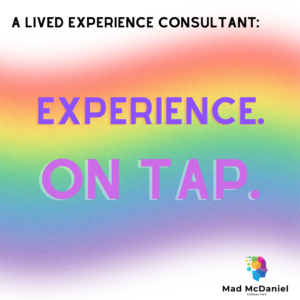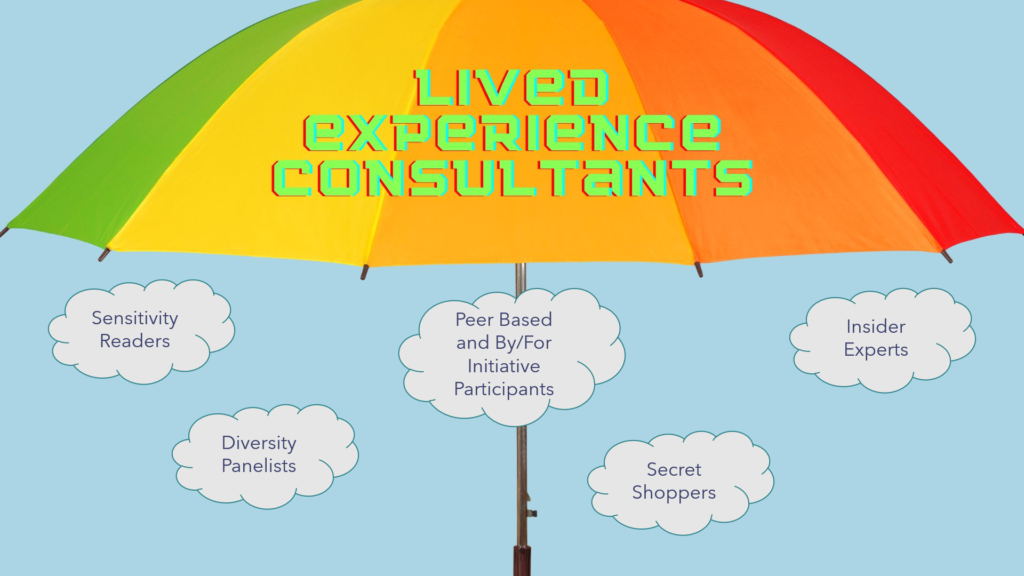What is a Lived Experience Consultant? Do I need one?

Hello! If you’ve come here from an external source, my name is Mad and I wear many support, coaching and consultancy hats. Recently, though, I’ve been doing some really exciting work as an Autistic Lived Experience Consultant. So naturally, I’m also getting a lot of people asking me what that is, and if it’s something they should also have.
Lived experience what?
A Lived Experience Consultant ( or LEC) is a specialized type of Diversity, Equity and Inclusion consultant who is part of one or more marginalized groups (like queer, disabled, BIPOC, or neurodivergent communities) and who only speaks as a member of that group.
We share our own perspectives and experiences to give businesses, managers and employers first-hand access to us, as representatives of the people who will be most directly impacted by decisions and policies directed at our communities. We don’t speak for those groups, but as a member of them, and only as members of those communities we share an identity with.
An LEC who is not autistic, for example, shouldn’t offer you specific advice on how to be more inclusive of autistic employees, even if they’re a parent or caregiver of an autistic person or otherwise disabled themselves. Instead they might be able to refer you to another, actually autistic, colleague.
Is this some new trend that’s going to disappear in 2 years?
Actually, LECs have been around for ages. You might have run across them under a different name, though:

Why would I want an autism LEC?
This past April was, depending on your source, either autism awareness, autism acceptance, or autism celebration month. You might have received some conflicting messages over the course of that month.
Maybe this is the first time that you’ve heard autistic adults asking you to use identity-first and not people first language (autistic person, not person with autism), or asking you not to support Autism Speaks or to use the gold infinity symbol instead of lighting it up blue or the puzzle piece to show your support. If this is a very different message than ones you’ve heard in the past, then it’s perfectly reasonable for you to need more information, or to struggle with knowing what is the “right” information.
You may, if you were looking for that information, have asked an autistic friend, family member, acquaintance or colleague. Or you may wonder if it’s okay to ask them. Or whether asking will be painful. That’s fair too. A lot of us are very tired or even completely burned out from advocating for ourselves and our community on top of all the other demands of everyday life and work.
Especially if these questions come from a perspective of professional responsibility instead of just personal curiosity, this is where having access to a lived experience consultant can be extremely useful. We exist as examples of people who are not only directly impacted by any changes or policies you might make, but also people who have chosen to make ourselves available to discuss these issues and their impact on us freely and openly.
We’re the safe space where there are no stupid questions, and where our only goal is to give you access to a bigger picture than you might not have otherwise had without including us directly in the conversation.
We are professional communicators, and because we’re not neurotypical, we may not communicate in exactly the same way as you do, but we are very good at helping others both understand and bridge any communication gaps that might exist.
We give you permission, in our professional capacity, to ask those questions it might be inappropriate, or embarrassing to ask in other circumstances. And to answer in a patient and empathetic way.
We’re not magically immune to exhaustion, anger, or burnout, but we do have experience feeling out our limitations and only offering our services when we have the capacity to set them aside for the benefit of mutual understanding.